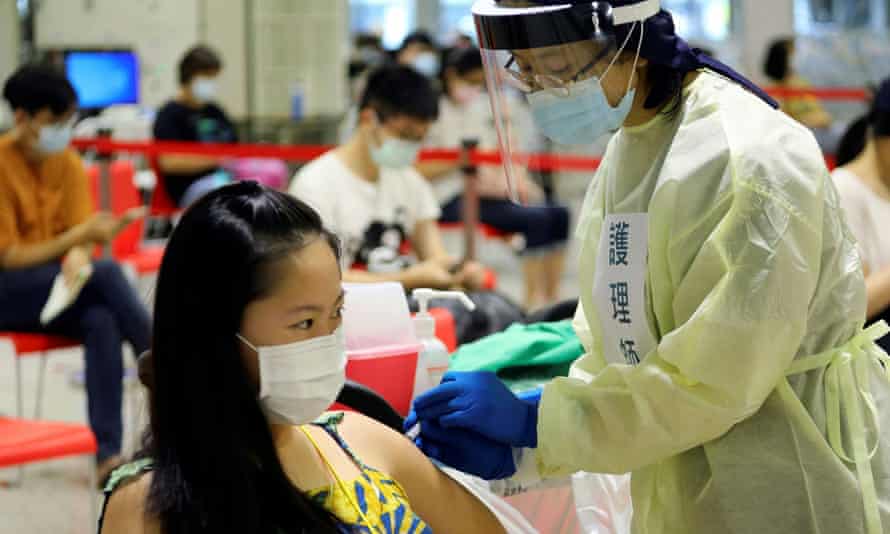Taiwan hits zero Covid cases for first time since outbreak in May
Acceleration of vaccine rollout and test-and-trace improvements credited for turnaround

Taiwan has reported zero community cases of Covid-19 for the first time since its biggest outbreak began in May, killing more than 800 people.
“The local confirmed case today is zero, it was not easy,” the head of the Central Epidemic Command Centre, Chen Shih-chung, said on Wednesday.
“I believe everyone is happy about this zero, but it doesn’t mean that the Covid-19 is completely cleared in Taiwan. There is still a long way to go, but this zero means that the epidemic is relatively stable.”
The island’s ability to keep the pandemic out of the community was a global success story. Residents lived a largely normal life for most of 2020 and early 2021, albeit with closed borders.
But in May an outbreak of the Alpha strain, believed to have been introduced via airline crews, caught hold and spread across every county. The government enacted lockdown measures but was criticised early on for not going hard or early enough, and the population remained under level three restrictions (in a four-level system) for almost three months.
At the Alpha outbreak’s peak, Taiwan was reporting more than 500 cases a day. The outbreak also caused 818 of Taiwan’s total 830 recorded Covid-19 deaths, including one woman in her 70s reported on Wednesday.
Chen said Wednesday’s announcement was “just the start of hope”, and authorities would observe the situation for a while before further relaxing restrictions.
The alert was dropped to level two on 27 July, but not all county governments have passed it on in totality, instead maintaining limited closures and restrictions. In some cities students have returned to school, restaurants have reopened for in-person dining, and sport and other entertainment is restarting.
Health experts and former senior government figures had expressed concern in the early weeks of the outbreak that Taiwan had grown complacent with its success and not kept up with recent science, including around the faster variants and new awareness of aerosolised spread.
It was also not conducting mass testing, instead relying on its trace and isolate procedure, which authorities said was initially overwhelmed. During the three-month outbreak, 2,548,825 tests were conducted.
Taiwan was also far behind in vaccinations compared with other countries, owing to a combination of insufficient orders, global supply issues, alleged Chinese interference in procurement and vaccine hesitancy in the population.
But the outbreak led to improvements in Taiwan’s responses. Testing and tracing capabilities were scaled up, and vaccine rollouts accelerated with the assistance of overseas donations and the development of Taiwan’s Medigen vaccine. More than 40% of the population have had at least one dose, although only 3% are fully vaccinated, according to Our World In Data.
This week, the government announced increased measures to avoid an outbreak of the Delta variant. In June, a handful of Delta cases in southern Taiwan were quickly contained but the island has not yet had to deal with rampant spread of the much more infectious strain.
Additional reporting by Chi Hui Lin
… as you're joining us from Taiwan, we have a small favour to ask. Tens of millions have placed their trust in the Guardian’s high-impact journalism since we started publishing 200 years ago, turning to us in moments of crisis, uncertainty, solidarity and hope. More than 1.5 million readers, from 180 countries, have recently taken the step to support us financially – keeping us open to all, and fiercely independent.
With no shareholders or billionaire owner, we can set our own agenda and provide trustworthy journalism that’s free from commercial and political influence, offering a counterweight to the spread of misinformation. When it’s never mattered more, we can investigate and challenge without fear or favour.
Unlike many others, Guardian journalism is available for everyone to read, regardless of what they can afford to pay. We do this because we believe in information equality. Greater numbers of people can keep track of global events, understand their impact on people and communities, and become inspired to take meaningful action.
We aim to offer readers a comprehensive, international perspective on critical events shaping our world – from the Black Lives Matter movement, to the new American administration, Brexit, and the world's slow emergence from a global pandemic. We are committed to upholding our reputation for urgent, powerful reporting on the climate emergency, and made the decision to reject advertising from fossil fuel companies, divest from the oil and gas industries, and set a course to achieve net zero emissions by 2030.
If there were ever a time to join us, it is now. Every contribution, however big or small, powers our journalism and sustains our future. Support the Guardian from as little as $1 – and it only takes a minute. Thank you.
沒有留言:
張貼留言